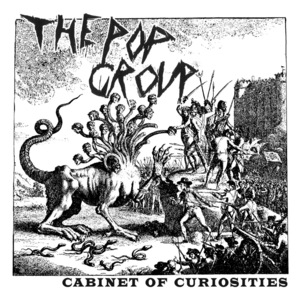Prior to their reformation in 2010, Bristol’s foremost exponents of primal post-punk funk, The Pop Group, seemed destined to remain one of those bands whose influence upon other musicians lay in inverse proportion to their exposure to the public in general. Cited as a major influence by both the Minutemen and Nick Cave, their two albums Y and For How Much Longer Do We Tolerate Mass Murder? were for some time only available as expensive imports. My copy of Y cost almost £30 over 15 years ago in a big record store in Manhattan, but the allure of such hard to find seminal music was impossible to resist, and I certainly wasn’t disappointed when I popped the CD into my stereo.
I managed to find mp3 copies of We Are All Prostitutes (their second album with the addition of the single that spawned the infamous image of a particularly evil looking Maggie Thatcher flicking the Vs, and not the kind more usually associated with victory), and their collection of live rarities and early demos, We Are Time, online, but that was it. Whilst their studio recordings were great, it didn’t prepare me for how genuinely thrilling and downright danceable The Pop Group were live, when I first saw them playing The Garage in 2010 and again when they shared a New Year’s Eve bill with Sonic Youth, Shellac and Factory Floor later that year.
Whilst Y is a pioneering and iconic debut, by the time it was recorded with legendary reggae guitarist and producer Dennis Bovell, the band had become enamoured with the possibilities of using the studio as compositional tool and therefore sacrificed some of the immediacy of their sound in favour of the creation of more abstract, dub-inspired soundscapes. A collection of early live and demo recordings, the reissued We Are Time offers a compelling snapshot of The Pop Group at their most direct, that attains a near white-hot intensity in parts. Its companion CD Cabinet Of Curiosities, which can be bought separately or together as the Curiosities double, extends the original album’s remit to include the unavailable for some time single ‘Where There’s A Will,’ a previously unreleased version of ‘She Is Beyond Good And Evil’ produced by Roxy Music’s Andy Mackay, and material from their 1978 John Peel session.
Whilst each of ten the cuts on We Are Time make for essential listening, five genuine stand out moments readily bring home The Pop Group’s role as innovators of a sound that would soon be taken up by lesser (although in my opinion still wonderful) acts such as The Fire Engines and Big Flame. Opening track ‘Trap’ is easily one of their finest moments, Gareth Sager’s Trout Mask Replica inflected guitar twang, Mark Stewart’s enigmatic, echoed vocal and Bruce Smith’s restless drumming recalling the hyperactive best of their stateside avant-funk contemporaries James Chance and the Contortions. ‘Genius Or Lunatic’ and ‘Sense Of Purpose’ offer prime examples of how effective the band were at imbuing the spikiest of tunes with memorable pop hooks. The latter track finds Stewart sounding almost pious in his sincerity and assumed authority, as he intones: "Science has no soul/Science has no conscience/We are not fuel/We are not consequences."
Stewart sounds like an idealistic, incendiary preacher throughout, albeit one who would advise his flock (on ‘Trap’): "Choice of freedom to say no/If God is evil, to the devil we go." ‘Colour Blind’ (dedicated to Ian Curtis at recent live shows) is the band’s most emotionally moving song and undoubtedly one of the greatest tunes of its era, a slow build beginning with a baby’s cry and throbbing bass, each chorus hitting a crescendo of vocals and coruscating guitar. Whilst the version ‘We Are Time’ that appeared on Y is that album’s most successful track and hard to dismiss as the definitive article, the live version from Glastonbury 1979 on offer here, replete with wild saxophone, is strung so utterly tight and demented in its delivery that whilst it’s on the stereo it sounds like the best version of anything, ever.
Cabinet Of Curiosities works best as a necessary companion piece to We Are Time rather than as a standalone album, but there are still some great tracks on it. ‘Where There’s a Will,’ which first appeared on split single with the Slits, is perhaps their most successful fusing of danceability with political message, but still retains an edgy, manic looseness. A live rendition of ‘Colour Blind’ from a Brussels show in 1978 sees the track fairly faithfully translated, with Stewart relishing his delivery of the youthfully naive but still fantastic chorus: "Only the intense can dance without moving." The dry, abstract funk of ‘Don’t Sell Your Dreams’ is another hard hitting live version that provides numerous reasons to prefer it to its studio counterpart.
A Peel session version of ‘We Are Time’, seems lethargic by comparison to its other incarnations, and the final three tracks complete a picture that by this point is mainly going to be of interest to hardcore Pop Group fans. Nevertheless, taken in their entirety, the tracks on these two releases provide enough ineluctable argument to convince those uninitiated into the ways of this band of their inherent greatness. For those amenable to that, not unreasonable suggestion, attendance at any of their upcoming gigs is also highly recommended.
<div class="fb-comments" data-href="http://thequietus.com/articles/16446-the-pop-group-we-are-time-cabinet-of-curiosities-review” data-width="550">


